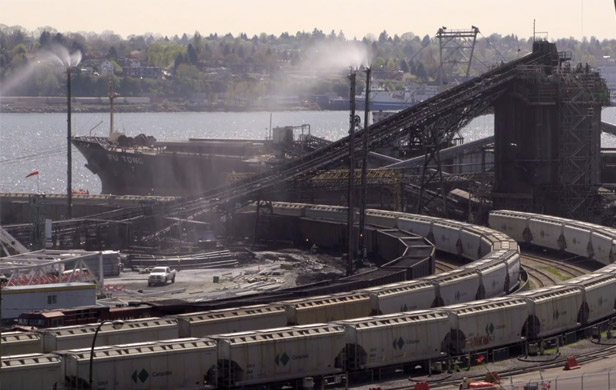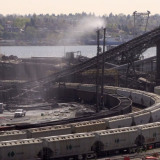
By Andrew Gage and Anna Johnston – republished with permission from the West Coast Environmental Law Association.
On October 23, 2014, the federal government introduced Bill C-43, A second Act to implement certain provisions of the budget tabled in Parliament on February 11, 2014 and other measures (also called the “Economic Action Plan 2014 Act, No. 2”). Buried in Division 16 of the 475 page omnibus bill are proposed changes to the Canada Marine Act that, if adopted, would pose a serious threat to legal protection from environmental threats and public oversight of activities that occur in ports.
The proposed amendments raise a number of concerns for British Columbians, especially as they relate to controversial shipping industries like coal and LNG – indeed one of the most troubling amendments could be viewed as a direct challenge to a lawsuit filed by Voters Taking Action on Climate Change against the environmental assessment of the controversial Fraser Surrey Coal Docks. For detailed information, see our legal backgrounder Bill C-43: A threat to environmental safety and democracy, but two of the most concerning changes are:
- Allowing the federal Cabinet to exempt port lands from key requirements of the Canadian Environmental Assessment Act 2012 and Species At Risk Act that regulate “federal lands” by turning those lands over to port authorities.
- Giving Cabinet extensive powers to write new laws for ports, and to delegate law-making powers for ports to any person, without many checks and balances.
Exempting “federal lands” from federal environmental laws
Some federal environmental statutes create special environmental requirements for activities taking place on “federal lands.” Examples include:
- Canadian Environmental Assessment 2012– the requirement to consider the environmental impacts of projects – even where they would not otherwise require an environmental assessment;
- Species At Risk Act– The requirement to protect land-based endangered and threatened species and their habitat on federal lands.
Bill C-43 gives the federal government the ability to get around these legal protections by converting federal lands into port lands. Specifically, Cabinet would gain the ability to sell its lands in a port to the port authority. Once it does so, even though the port authority is supposed to act as an agent of the federal government, those lands will no longer be considered “federal lands.”
And, presto, as if by magic those nasty environmental protections disappear.
A controversial coal port proposed for Surrey, BC gives a tangible example of what this might mean. As we write in the backgrounder:
[quote]…Fraser Surrey Docks LP’s proposed Direct Transfer Coal Facility in Surrey, BC was required to undergo a federal environmental assessment by the Vancouver Fraser Port Authority because the project occurs on federal lands under Port Authority supervision. The Port Authority’s approval of the facility has been challenged in court by a group of citizen and non-profit applicants represented by Ecojustice and Beverly Hobby (with funding from West Coast) for failing to follow the requirements of CEAA 2012. If the Bill C-43 changes to the Canada Marine Act come into effect and the federal government were to sell the property on which it is located to the Port Authority, it would be possible for controversial projects like this one to bypass reviews under CEAA 2012 altogether.[/quote]
Trust us, we’re law-makers
The second thing that Bill C-43 does is to turn over exceptionally wide law-making powers to Cabinet, including giving it the ability to turn broad powers over to port authorities, provinces or even industry. While Cabinet often has the power to make regulations under a statute, these powers are exceptionally broad, and include powers to:
- hand over regulatory, administrative or even judicial (court) control of industrial activities in ports to any person, including a province, port authority or even industry itself;
- powers to incorporate industry or other documents in the regulations without necessarily making those documents publicly available;
- create rules for the retention or destruction of documents.
The Bill provides few explicit constraints over how these powers could be used, and the government hasn’t given any real indication as to its plans, but:
Powers that can be delegated include responsibility for making laws and policies regarding specified industrial activities in ports, administering activities under those instruments, and hearing disputes that occur regarding port activities. For example, Cabinet could in principle allow an industry association to write the rules regarding the assessment and permitting processes for LNG facilities and coal storage, and the shipping of both. It could then incorporate those rules into federal law without public notice or opportunity to comment.
The Bill even purports to allow Cabinet to take oversight of the new rules away from the courts by creating a tribunal to hear any disputes regarding those activities in ports, including challenges by the public. It could appoint industry representatives as the tribunal’s members and authorize port authorities to write the rules governing port activities and for hearing disputes (including who would have standing to bring a challenge).
Canadians understand the value of checks and balances and transparency in laws. These amendments do away with both.
Secret amendments
What are these amendments doing in a budget bill? This is the latest of a series of amendments to environmental laws that have been hidden in voluminous budget bills and debated by the House Finance Committee (instead of environmental committee). This is not the way democracy is supposed to work, and now is the time to say no.
Andrew Gage and Anna Johnston are staff counsel at the West Coast Environmental Law Association. They are calling on concerned citizens to write to Finance Minister Joe Oliver about this proposed omnibus budget bill.


Wait a sec, the “Carbon Neutral” Province of BC is exporting coal?!
I thought the idea behind exporting LNG from BC was so that countries like China could reduce the burning of coal.
The BC Govt takes $millions out of school boards and healthcare to purchase carbon offsets, so it can say it is “Carbon Neutral”.
Just a few corrections. The carbon neutral claim is only made for public sector buildings/institutions and government operations. It does not relate to the province as a whole or the private sector. Second point, if we want to prioritize carbon reduction the offsets that were purchased by the public sector were the most economical way to do this while keeping the money in the province. Last point, I agree that on first glance the carbon offset program looks horrible and takes money from services, however it did have a very meaningful impact in reducing emissions in BC, and these costs were less than the cost of phone services.
No one has ever said that BC is innocent from carbon emissions, we export more coal than we burn in total for emissions, and same goes for natural gas. It is hypocritical, and we need the leadership to move away from this.
Yay democracy.
As if daily war crimes wasn’t enough. A real piece of work, that one.